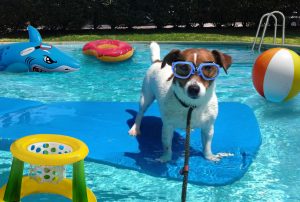 Summer means fun in the sun. If you are fortunate enough to own a pool, or have access to one that allows dogs, it’s important to be aware of the hazards. The goal is to enjoy this time with your furry friends while enabling them to have a safe and enjoyable time in the water.
Summer means fun in the sun. If you are fortunate enough to own a pool, or have access to one that allows dogs, it’s important to be aware of the hazards. The goal is to enjoy this time with your furry friends while enabling them to have a safe and enjoyable time in the water.
Pool safety for pets includes two important parts: around the pool and in the pool.
The same hazards that affect people can cause injury to pets. These include:
• Heat stroke
• Dehydration
• Orthopedic injuries caused by slipping on wet cement or grass
• Paw burns or abrasions from contact with hot cement or other surfaces
Signs of Heat Stroke
• Anxiety
• Panting
• Dark red gums
• Dry mucus membranes (specifically the gums)
• Lying down and unwilling (or unable) to get up
• Collapse and/or loss of consciousness
• Dizziness or disorientation
• Increased rectal temperature (over 103 degrees Fahrenheit)
• Brachycephalic breeds (bull dogs, pugs, boxers) are more prone to overheating so be extra cautious with these breeds or mixes
You can not determine your pet’s body temperature or overall health by the way their nose feels. A cool, wet nose does not always mean they are healthy. If the inside of their ears or the skin on their belly is warm to the touch, you may want to check their temperature. The best way to take your pet’s temperature is to use a pediatric, rectal thermometer dipped in a pet-safe lubricant. The normal temperature for a cat or dog is between 100 and 102.7 degrees Fahrenheit.
If your pet experiences heat stroke, seek immediate medical attention.
For more information on heat stroke, visit our blog.
Dehydration
Keep a bowl of clean, cool water available at all times. Drinking large quantities of water from the pool, or making pool water the primary source of water, should be discouraged. Encourage your to dog to take frequent water breaks when running around.
Paw Pad Burns/Abrasions
Injuries to the paw pads can be very painful for your pet so it is important to be proactive and help prevent them from occurring. Common surfaces that retain heat include pool decks, asphalt pavement, cement and sand.
How to Detect if Your Pet’s Paws have been Burned
• Reluctance to move after walking on a hot surface
• Painful feet and paws when touched
• Lameness (holding one leg up or leaning to one side)
• In Severe Cases
– Bleeding or oozing from the paw pads themselves
– Peeling/sloughing of the pads to expose the tissue underneath
What to Do
• Remove your pet from the hot surface
• Apply a cold (but not icy) compress
• Seek veterinary care immediately
Prevention
• Check the surface – If it is hot on your hands or bare feet, it is too hot for your pet!
• Try to encourage walks on grass, or only walk in the mornings or evenings when hot surfaces are cooler and less likely to retain heat
• Try to minimize the length of time that your pet walks on hot surfaces and encourage breaks
• Utilize booties if your pet must be on hot surfaces (make sure your pet will tolerate the booties and not take them off and ingest them)
• Avoid thick creams, ointments, and lotions that can trap heat in the paw
Like children, pets should be closely monitored at all times while playing in the water.
Drowning
Many dogs love to swim, but some tire more easily than others. A tired swimmer is at risk of drowning, as are those who fall into the pool accidentally and panic. Here are some things to consider:
• Never leave your pet unattended in the water or around the pool
• Provide a ramp or shallow steps so your pet can easily and safely get in and out of the water
• Make sure your pet wears a life jacket made specifically for animals
• Offer a skittish pet the option of floating on a raft or mat with you if they prefer not to swim
• Monitor your pet closely so that he/she is not ingesting pool water during a routine swim
Chemical Dangers
• Pools that are not properly maintained may contain algae and higher than normal levels of chlorine or salt. These can irritate your pet’s mouth and gastrointestinal track.
• Chlorine powder and tablets should be stored out of your pet’s reach. Depending on the amount ingested, chlorine can create a medical emergency for your pet.
• After swimming, rinse off your pet with fresh water to remove any chlorine from the skin and fur.
Should your pet experience an emergency, contact your primary care veterinarian or one of Red Bank Veterinary Hospital’s emergency hospitals in Cherry Hill, Tinton Falls, Linwood or Hillsborough. All locations can be reached by calling (732) 747-3636.